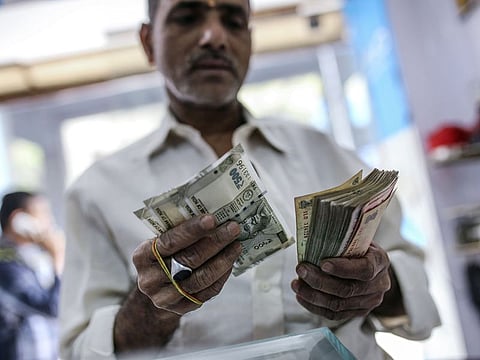Indian rupee back down to monthly low of 23.25 against UAE dirham: Remit or wait?
Rupee snaps two-day winning streak to open down 13 paise to 85.55 vs. US dollar on Tuesday

Dubai: The Indian rupee has dipped again, falling 13 paise to ₹85.55 against the US dollar, which is a 11 paise drop to 23.25 against the UAE dirham. This puts it at its lowest point in nearly a month, raising the big question for Indian expats in the UAE: do you send money home now or wait for a better rate?
Why the rupee is weaker this week
After gaining slightly in recent days, the rupee has once again lost ground. The fall came as global investors reacted to fresh concerns about the US economy — particularly a warning from ratings agency Moody’s, which flagged growing debt risks in the US. While that pushed the US dollar slightly lower against other currencies, it wasn’t enough to lift the rupee.
Adding to the mix is the stability in oil prices. Brent crude is holding steady around $65 per barrel, and with India being a major oil importer, stable oil prices can help ease pressure on the rupee. However, geopolitical uncertainty — including continued tensions between the US, Russia, and developments in the Middle East — still casts a shadow on global currency markets.
What this means for your remittances
So far in 2025, the rupee has slipped by 0.3% against the US dollar. Against other currencies like the euro and pound, it has dropped more — over 6% and 5%, respectively. But for UAE-based Indians who remit in dirhams, the more relevant figure is the 23.25 level — a psychological comfort zone for many regular remitters.
Currency experts say the rupee is likely to trade in a range of 85.00 to 85.80 (about 23.15–23.40 against the dirham) in the near term. Without any big events or policy changes on the horizon, the rupee may remain stable — though some traders believe it could weaken slightly if US borrowing costs continue to rise.
Should you remit now?
If you're sending money home regularly to cover expenses or EMIs, this dip offers a decent window — not the best rate of the year, but close to it. However, if you're holding out for a sharper drop (say, 23.40 levels), you'll need to watch the US dollar's movements and global oil prices closely.
Financial advisors typically suggest remitting in smaller chunks if you're uncertain — that way, you can still benefit if the rate improves later.
For now, the rupee’s weakness gives UAE-based Indian expats a small advantage — and it might be worth locking in that rate before markets shift again.
Sign up for the Daily Briefing
Get the latest news and updates straight to your inbox



